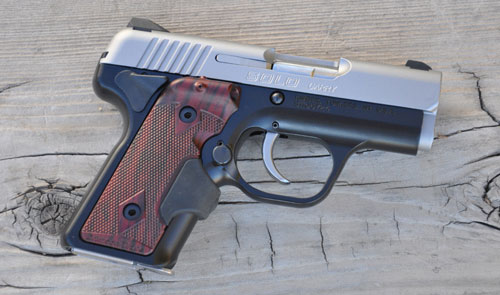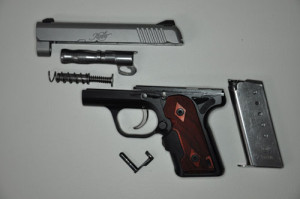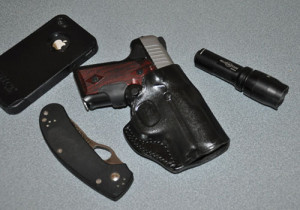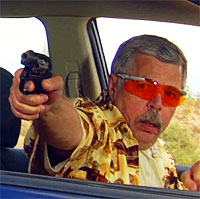 Pistols, especially 1911 pistols, are selling like the proverbial hotcake these days and Kimber Manufacturing, Inc. is producing and selling more 1911 pistols than any other manufacturer. Kimber also produces a sub-compact 9mm pistol called the Solo and consumers must like it; Kimber is selling every one they can make and is increasing production to keep up with demand. I wanted a Solo as soon as I saw one at Kimber’s booth at the SHOT (Shooting Hunting and Outdoor Trades) show in Las Vegas. It took me a few months to get my hands on one, and then, as is my habit when testing a new carry pistol, the Solo became one my primary carry pieces. The Solo and I have gotten to know each other over the past few months, so let me tell you what I have discovered.
Pistols, especially 1911 pistols, are selling like the proverbial hotcake these days and Kimber Manufacturing, Inc. is producing and selling more 1911 pistols than any other manufacturer. Kimber also produces a sub-compact 9mm pistol called the Solo and consumers must like it; Kimber is selling every one they can make and is increasing production to keep up with demand. I wanted a Solo as soon as I saw one at Kimber’s booth at the SHOT (Shooting Hunting and Outdoor Trades) show in Las Vegas. It took me a few months to get my hands on one, and then, as is my habit when testing a new carry pistol, the Solo became one my primary carry pieces. The Solo and I have gotten to know each other over the past few months, so let me tell you what I have discovered.
Stats and Specs
 The Solo was designed to be kind of like a 1911. That is, it looks like a tiny 1911, has ambidextrous 1911 style thumb safeties and 1911 style dovetailed three dot combat sights, but that’s where the similarities end. The trigger is a pivoting double action (DA) type that resets when allowed to move all the way forward and after the slide has cycled. On my sample the trigger has a smooth let-off with little stacking, or building of pull weight. It simply moves straight back and snaps with just a bit of over travel. Average trigger pull weight measures right around 8 pounds but it really feels much lighter than that. It is a very good DA trigger.
The Solo was designed to be kind of like a 1911. That is, it looks like a tiny 1911, has ambidextrous 1911 style thumb safeties and 1911 style dovetailed three dot combat sights, but that’s where the similarities end. The trigger is a pivoting double action (DA) type that resets when allowed to move all the way forward and after the slide has cycled. On my sample the trigger has a smooth let-off with little stacking, or building of pull weight. It simply moves straight back and snaps with just a bit of over travel. Average trigger pull weight measures right around 8 pounds but it really feels much lighter than that. It is a very good DA trigger.
The Solo has a 2.7″ barrel, weighs 17 ounces with an empty magazine in place and weighs 20.3 ounces ready to carry, that is, with the magazine fully loaded with six rounds and one in the chamber. Surprisingly, this little pistol has an ambidextrous magazine release, a feature not usually found on 1911 pistols. Combined with the ambi safeties, the Solo is “good to go” for both right handed and left handed shooters. Careful examination of the Solo leaves an impression of outstanding fit, finish and quality.
The little Kimber ships with two stainless steel magazines, a nice zippered soft case, and a detailed manual. Field stripping for cleaning is straightforward; unload the pistol, pull the slide back until the takedown notch in the slide aligns with the slide stop and remove the slide stop. To get the slide off the frame, pull the trigger and move the slide forward. The recoil spring assembly is removed by lifting it out of the notch where it seats below the barrel lug then the barrel can be removed from the rear after turning it so the lug is facing about 45 degrees off center.
Laser Grip
Kimber makes several models of the Solo, to include the Solo Carry Stainless, a two tone model called the Solo Carry and one equipped with Meprolight night sights and a Crimson Trace Lasergrip called the Solo CDP (LG). Small defensive pistols like the Solo benefit greatly from the addition of a laser so my Solo Carry is equipped with the Lasergrips. I like to zero the laser to be in the middle of, or just above, the front sight at across the room distances – let’s call it 20 feet. Although the three dot sights on the Solo are quite good, having the laser on the pistol adds another level of capability and you give up nothing for it as the pistol still fits in a standard holster. What’s not to like?
Shooting The Solo
Okay, I’m not going to lie or try to convince you I’m Superman…shooting small, powerful, lightweight pistols is not one of my favorite activities. Little guns bite at both ends and the Solo is no exception. Far from being the most unpleasant I have fired (that would probably be an 11 ounce .357 Magnum revolver), the Solo is not the sort of pistol I would want to shoot all week in a training class. Still, the excellent sights and smooth trigger made getting hits as far back as 25 yards easy and practicing enough to feel confident with the pistol didn’t cause any injuries to my self esteem. Kimber thoughtfully rounded off and smoothed all the sharp edges on the Solo and that helps a lot with making it reasonably comfortable to shoot.
Kimber states the Solo is “…designed to function optimally using premium hollow-point self-defense factory ammunition with bullet weights of 124 or 147 grains.” I have run the pistol with everything from 115 grain ball ammunition to +P+ 124 grain Federal Hydra-Shoks and it hasn’t failed to feed or fire once. However, a word about +P or +P+ ammunition is in order. Any of the good standard pressure 9mm ammunition designed for defensive use should be all you will ever need in a little pistol like the Solo. What you get with the higher pressure stuff is more blast and recoil and very little, if any, increase in terminal performance. I doubt a bad guy would be able to tell the difference. Hold center, get the hits, shoot until they go away.
Little Gun Issues
Because the Solo is a little pistol designed to shoot high pressure ammunition and has a necessarily heavy recoil spring, operations like locking the slide to the rear can be difficult or impossible for some people. When the magazines are loaded to a full six rounds they are difficult to seat and depressing the magazine release to get a full magazine out of the pistol takes some effort. My wife, hereafter referred to as the Domestic Goddess (DG) doesn’t mind shooting the Solo, but she, along with some other ladies I have shown it to, can’t lock the slide to the rear or get the fully loaded magazines seated (or removed). These issues are not unusual with some of the other small pistols on the market and are not restricted to the Kimber. Before you buy (any pistol) make sure you or the intended recipient can run the gun.
Daily Carry
 When I carry a little pistol I usually carry two, my idea being that a second gun is a lot faster than trying to run a reload with a little pistol. For months now the Kimber Solo has been one of those carry pistols, usually riding on my right hip in my favorite carry holster for small pistols, the Stinger by Galco. I guess that speaks to my confidence in this little pistol. As we used to say in my Border Patrol days, “It will do to ride the river with.”
When I carry a little pistol I usually carry two, my idea being that a second gun is a lot faster than trying to run a reload with a little pistol. For months now the Kimber Solo has been one of those carry pistols, usually riding on my right hip in my favorite carry holster for small pistols, the Stinger by Galco. I guess that speaks to my confidence in this little pistol. As we used to say in my Border Patrol days, “It will do to ride the river with.”
About the Author:
 Ed Head is a regular on Shooting Gallery and Down Range TV. He has worked for almost 30 years in law enforcement, first in the United States Air Force and then with the United States Border Patrol, retiring as a Field Operations Supervisor. During his Border Patrol career, Ed worked in a variety of patrol, investigative and training capacities. Ed has an extensive background as a firearms instructor, having trained thousands, ranging from beginners to police, military and special operations personnel. Having taught at Gunsite for 20 years, Ed first trained there under the world famous shooting school’s founder, Jeff Cooper, then later ran the school as the operations manager for more than five years. Ed lives in Chino Valley, Arizona, where he continues to teach and write.
Ed Head is a regular on Shooting Gallery and Down Range TV. He has worked for almost 30 years in law enforcement, first in the United States Air Force and then with the United States Border Patrol, retiring as a Field Operations Supervisor. During his Border Patrol career, Ed worked in a variety of patrol, investigative and training capacities. Ed has an extensive background as a firearms instructor, having trained thousands, ranging from beginners to police, military and special operations personnel. Having taught at Gunsite for 20 years, Ed first trained there under the world famous shooting school’s founder, Jeff Cooper, then later ran the school as the operations manager for more than five years. Ed lives in Chino Valley, Arizona, where he continues to teach and write.
